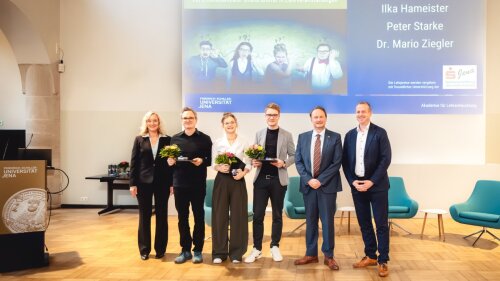
Teaching Award 2025
This year, the best course concept (€2,500) and the teaching prize under the theme “Teaching and learning culture in times of AI” (€2,500) will be awarded. Two outstanding teaching concepts were selected for the Teaching Awards 2025 from the nominations received.
Due to the quality of the many nominations received, the committee initially agreed on a shortlist in each case. These were as follows:
General Teaching Award:
- Prof. Dr. Delia Brauer with the course “Applied Glass Technology and Glass Industry Excursions”
- Dr. Manuel Robert Quaschner with the course “Linear Algebra I”
- Dr. Antje Rauers with the course "Out of the box: Development of an intervention to reduce negative age stereotypes"
Topic-related teaching award:
- Dr. Manuel Robert Quaschner with the course “Linear Algebra I”
The prize for the best course concept (€2,500) goes to Dr. Antje Rauers (Faculty of Social and Behavioral Sciences) for the (block) seminar "Out of the box: Development of an intervention to reduce negative age stereotypes".
The selection is justified as follows:
With her seminar, Dr. Rauers impressively succeeds in transferring theoretical content into practical application scenarios and specifically promoting a wide variety of skills among students. The seminar is therefore an outstanding example of application-oriented university teaching on the Master's degree course. The focus is on the development of psychological intervention concepts to reduce negative age stereotypes - a socially highly relevant topic that is often neglected in public discourse. The students work in a didactically very well-structured scenario that is characterized by a high degree of authenticity: They respond to a simulated call for tenders from a fictitious client institution, develop their own intervention programs in small groups, present them to a “selection committee” and reflect on their concepts at the end.
In addition to applying psychological theories and empirical findings, students strengthen their conceptual, communicative and argumentative skills. This is due, among other things, to the consistent support of the learning process through methodically diverse exercises and soft skills units - for example on feedback, professional presentation or creativity techniques. The students' appreciation of this course also deserves special mention: The seminar not only had an excellent didactic structure, but was also motivating, practical and highly conducive to learning.
Dr. Manuel Robert Quaschner (Faculty of Mathematics and Computer Science) was awarded the prize in the thematic focus area “Teaching and learning culture in times of AI” (€2,500) for the exercise and tutorial “Linear Algebra I”.
Dr. Manuel Robert Quaschner's teaching concept for the exercise and tutorial “Linear Algebra I” is characterized by the special didactic integration of AI tools, which addresses both the challenges of teaching in the introductory phase of studies and those of increasing digitalization. This is achieved through the targeted use of AI-generated mathematical proofs, which are critically analyzed by students in short Moodle tests and checked for logical consistency and technical correctness. In this way, not only are subject-specific skills deepened, but a conscious and differentiated use of AI tools is also learned and promoted.
The concept also impresses with its successful combination of analog and digital teaching formats. The didactic design follows a staged structure from guided to independent work and uses digital task formats (e.g. single-choice tests at analysis level) to achieve higher cognitive learning goals in digital contexts. The consistent integration of peer feedback and the structured support of individual learning processes are also outstanding.
In their nomination, the students particularly emphasized the high level of comprehensibility and the motivating support provided by Dr. Quaschner and praised his teaching concept as exemplary in terms of subject-specific, didactic and technological aspects.
Both teaching awards will be presented during this year's DIES LEGENDI – Tag der Lehre. de In addition to awarding the teaching prizes and presenting the teaching projects funded by the ALe, the DIES LEGENDI - Teaching Day is the annual format for exchanging ideas and thoughts on studying and teaching across disciplines and throughout the university.
More information on the content of this thematic focus will be published here soon.
- Faculty of Social and Behavioural Science: Teaching Award of the Student Council PsychologyExternal linkde
- Faculty of Physics and Astronomy: Teaching Award of the Student Council de
- Faculty of Economics and Business Administration: Teaching Award for academic mid-level faculty
- Faculty of Chemistry and Earth Sciences: Teaching Award of the Students Council ChemistryExternal linkde
- Faculty of Medicine: Janus-Cornarius Teaching Award of the Student Council de
- Faculty of Mathematics and Computer Science: Teaching Award of the Student Council for MathematicsExternal linkde

